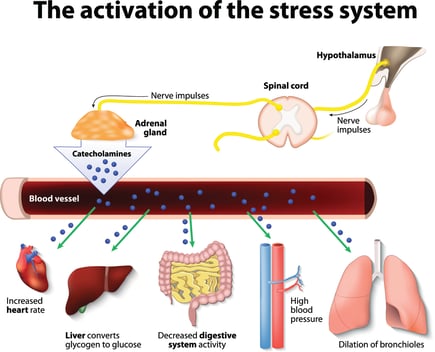In a previous article, I talked about the Japanese concept of ikigai, or “reason for being.” To achieve full ikigai, your passion and purpose in life must align. When this happens, your life is lived with joy. But what about when the opposite happens – when your life is out of balance and you are overwhelmed by stress? And if you are a teleworker striving for the ultimate work-life balance, what happens when the balance tips and you find yourself lost in a maze of stress?
Stress costs the United States approximately $300 billion every year due to “accidents, absenteeism, employee turnover, diminished productivity, and direct medical, legal, and insurance costs.” And stress that is left unchecked can lead to a wide range of mental and physical health problems, including hypertension, cardiovascular disease, diabetes, depression, and even cancer.
Numerous studies confirm that occupational pressures and fears are by far the leading source of stress for American adults, and that these have increased steadily over the past few decades. The severity of job stress depends on the magnitude of the demands that are being made and the individual’s sense of control or decision-making latitude in dealing with these demands. The main causes of occupational stress are workload (46%), interpersonal issues (28%), juggling work/personal lives (20%), and lack of job security (6%).
In the most extreme cases, stress from overwork can lead to health problems that result in death. This became recognized as such a serious problem in Japan that in 1987 the Japanese Labor Ministry officially recognized karoshi – or “death from overwork” – as a cause of death. The major causes of karoshi are heart attack and stroke. There is no doubt that stress is a pervasive problem that must be addressed.
Home Office Stress
This brings us back to the topic of the home office. Home office workers are often thought to have the most stress-free work environment. If you work from a home office, you may have even chosen this arrangement to promote a healthy work-life balance. However, while ditching a hair-pulling commute or being removed from daily office politics can certainly alleviate some stress, there are a host of other stressors that can arise from having a home office.
A 2017 research study delved into the stressors associated with the home office, and found that the greatest stressor is the blurring of boundaries between work and home life. This can result in work-family conflict, which at times seems to negate the benefits of a home office. Anyone who works from home can attest to the stress of wearing multiple hats throughout the day. There are days when the interruptions caused by children, spouses, neighbors, a leaky faucet, the FedEx delivery guy, and the barking dog are enough to have you searching for a job as far away from home as possible. And that pesky commute you were so happy to be rid of? You sometimes long for time in the car to transition from the demands of work to the demands that await you at home. When you work from home, there is no escape and no transition time. You are always on duty. And you sometimes feel that you simply cannot please everyone – or anyone.

Blurred Home Office Lines
What is Stress Anyway?
Let’s back up a little and take a closer look at stress. So, what is stress? In a nutshell, stress is a physical, mental, or emotional reaction to change. This reaction is often in response to a situation we perceive as taxing or exceeding our resources and endangering our well-being. At the heart of all stress is a sense of our loss of personal control - even if the change is a positive one.
Prolonged stress contributes to illness by causing our mind and body to become exhausted, worn down, and damaged; by weakening immunity; and by motivating unhealthy behaviors to deal with the stress (while also inhibiting healthy behaviors). Inflammatory hormones are released when we are stressed. This increases cardiovascular and cancer risk, among other issues.
The Physiology of Stress
Have you ever stopped to consider what’s actually going on in your body when stressed? Even if science isn’t your thing, you may find the physiology of stress fascinating… and as always, knowledge is power.
One physiological response to stress is the flight-fight-freeze response. This is our natural reaction to run away/avoid (flight) or confront (fight) the stressor, or to play dead (freeze). In the flight/fight mode, you may feel like you have superhuman survival powers. This is because the flight/fight response involves the release of adrenaline which:
- elevates heart rate and blood pressure (to provide more blood to muscles)
- constricts the blood vessels of the skin (to limit bleeding if wounded)
- dilates the pupil of the eye (to let in more light, thereby improving vision)
- increases activity in the reticular formation of the brain (to increase the alert, aroused state)
- liberates glucose and free fatty acids from body storage sites (to make energy available to the muscles, brain, and other tissues and organs), and
- activates certain immune cells to prepare to defend the body if wounded.
The freeze response is also a survival response to a stressor but involves the conservation of energy and immobilization designed to lessen the impact caused by the stressor. Physiologically, this involves:
- loss of skeletal muscle tone (to create disinterest in a predator or to maintain blood flow to the brain if wounded)
- a drop in blood pressure (to reduce blood loss from wounds), and
- tightening of the larynx (to inhibit vocalization).
Each of the flight-fight-freeze responses can be adaptive or counterproductive in its own way.
A second physiological response to stress is activation of the HPA axis (hypothalamic pituitary adrenal axis), our central stress response system. In an immediate (acute) response to stress, cortisol, the primary stress hormone, is released by the adrenal glands. Cortisol increases levels of glucose in the bloodstream, enhances the brain’s use of glucose, and increases the availability of substances that repair tissues. This is a healthy and essential response to a stressor.

Stress system diagram
The flight-fight-freeze response and activation of the HPA axis are designed for short-term (minutes to hours) management of a stressful situation. If interaction with the stressor is prolonged, the ability to resist becomes depleted. In the extended (chronic) response to stress, cortisol alters metabolism (contributing to overweight and Type 2 diabetes), suppresses the immune system (increasing susceptibility to infections and disease), weakens bones, impairs memory, and worsens depression. At this point, the person becomes ill and exhausted. There is sometimes a delay between when the stressful event or period occurs and when the body’s resistance is fully exhausted and the illness appears. This is why the effects of stress are sometimes not fully experienced until after the stressful period has passed.
What Can you Do?
Of course there are a whole slew of suggestions on wellness and time management skills to help prevent some of the stressors before they even happen. Proper nutrition, exercise, and sleep are also vital. But not all stressors can be predicted or planned around. Here are some simple tips to reduce stress when you find that you are feeling unusually anxious or ready to shut down. While these are tailored to the home office worker, they are applicable in almost any setting.
Take a Hike
Get away from your office setting for even a few minutes. If you work from home, go outside. Take a walk. Get some fresh air. It doesn’t matter if it’s a perfectly sunny day or not. If it’s raining, grab your umbrella. If it’s cold, bundle up. The benefits of stepping away to clear your head, be in nature, and get your heart pumping even a little bit cannot be overstated. If you have the ability to head to the gym or go for a run, do it. You will likely return to your desk a much more productive and healthy employee.
I recently found myself feeling extremely stressed after a day of mounting pressures at work and home. When the work day ended, I took the dog for a brisk 20-minute walk, made dinner, then hit the gym for one of my favorite aerobics classes. By the time I got home, I was a new person. My outlook had been restored and the stressors no longer seemed as large and threatening. This was a good reminder to listen to my body’s need for physical activity as a de-stressor.
Phone a Friend
Especially for those who work from a home office, times of stress can feel isolating. There’s no one in the office next door or in the cubicle down the hall to vent to when the stressors mount. You can always reach out to others when overwhelmed by stress. Send an instant message, pick up the phone, start a video chat – whatever it takes to connect with someone who can provide support. It may also be a good time to talk to your manager to make sure that deadlines and expectations are clearly understood and realistic, and that you have all the support you need to get the job done.
Choose Healthy Snacks
When stressed, it’s tempting to reach for whatever food is at hand, especially those comforting sugary snacks, baked goods, French fries, processed convenience foods, or caffeinated beverages. However, these “feel-good” foods and drinks quickly lead to a crash in mood and energy, worsening symptoms of stress. Look instead to foods with Omega-3 fatty acids to give your mind, and mood, a boost. The best sources are fatty fish (salmon, herring, mackerel, anchovies, sardines), seaweed, flaxseed, and walnuts. You could even snack on a small amount of dark chocolate. Also look to complex carbs such as vegetables, whole grains, and naturally sweet fruit. In addition to packing in the nutrients, these digest more slowly, resulting in more stable blood sugar. Drink plenty of water and give green tea a try. It is sometimes difficult to practice good self-care when stressed. Don’t trouble your troubles by engaging in unhealthy eating habits during stressful periods.

Choose the Healthy Snack
Take Deep Breaths
Taking deep breaths is an extremely effective strategy when stressed. The physiological changes during stressful situations can lead to rapid, shallow, erratic breathing. Slow, deep, regular breathing is a sign of relaxation. You can learn to control your respiration to mimic relaxation by practicing simple breathing exercises. There are many websites and tools that can guide you through breathing exercises, including this simple site with three common and useful techniques that can be practiced daily and mastered for use in stressful situations. When working from a home office, there is no one around to raise their eyebrows as you exhale with a loud whoosh, so go right ahead. (If you work in an open office setting, you can practice some of the more subtle breathing exercises or retreat to a private space.)
Focus your Thoughts
Meditation can slow your heart rate, lower your blood pressure, reduce your breathing rate, diminish your body's oxygen consumption, reduce your blood adrenaline levels, and change your skin temperature. You don’t need to drop to the floor and strike your best yoga pose to meditate. There are some simple things you can do right at your desk. Try repeating a positive mantra, such as “This will pass,” “I have the information and skills I need,” “I am doing a great job facing this challenge.” You could also read an inspiring quote or poem, or close your eyes for a minute and visualize a few things for which you are grateful and that bring you joy – anything that brings your mind to a more relaxed and present state of consciousness.
Stretch it Out
I don’t think stretching gets enough credit in our fast-paced world. Yet stretching has numerous benefits, including reducing muscle tension, increasing range of motion in joints, enhancing muscular coordination, increasing circulation, and increasing energy levels. Stressed muscles are tight, tense muscles. By learning to relax your muscles, you’ll be able to use your body to dissipate stress. You can do stretching exercises right at your desk to release tension and to experience the sensation of relaxation from your face down to your toes.
Keep Stress at Bay
While some workplace stress is to be expected and can even be a healthy motivator, prolonged or debilitating stress is hazardous to your health. By staying committed to healthy habits and activities that prevent or reduce stress, we can keep unhealthy stress – and karoshi – at bay. This allows us to instead pursue our individual ikigai, and to live a healthy, purpose-filled life.




.jpg)

.png)
.png)
/Employee%20Autonomy%20Part%202%20(Blog%20Title).png)
.jpg)


.jpg)
.jpg)
.jpg)
.jpg)
.jpg)
.jpg)
.jpg)
-1.jpg)

